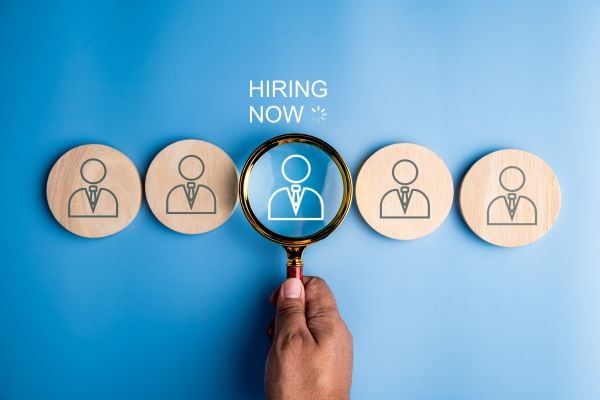The type of questions you ask candidates during a job interview should vary based on where you are in the hiring process. Questions should match the purpose and intent of the interview.
As a Toronto-based headhunter with 15+ years of experience, I believe there are certain questions you should and shouldn’t ask during the first round of interviews. A detailed interview process can ensure you ask the best questions at the appropriate time to better assess candidates during the hiring process. So, what questions should you ask? Which questions should you discard? I’ve devised a list of questions for you to use.

Here is what I’ll cover in this blog:
- Understanding the purpose of first-round job interviews
- The types of questions interviewers should ask – A list of 15
- The 5 types of questions you shouldn’t ask
What is the purpose of the first round of job interviews?
The overarching objective of job interviews is the hire the best candidate for the job. But with most companies now using a multiple job interview process, each interview plays a specific role in the process.
Learn more: How Many Job Interview Rounds is Too Many?
The purpose of the first round of job interviews is to narrow down the pool of candidates. Depending on the job type, quality of the candidate pool, the number of available positions, and other factors, you could be interviewing a sizable list of candidates.
Here are the things you should be assessing during the first interview:
- Qualifications: Confirm that the candidate meets the minimum requirements for the job, such as education, experience, and specific skills.
- Interest and enthusiasm: Assess the candidate’s motivation for applying, how well they understand the role, and whether they are genuinely interested in the company and industry.
- Communication skills: Observe how well the candidate communicates, which is often essential for both the role and for fitting in with the team.
- Cultural fit: Get a sense of whether the candidate aligns with the company’s values, mission, and workplace environment.
- Clarify role details: Provide the candidate with more information about the job and answer any questions they may have, ensuring alignment in expectations on both sides.
The first interview helps reduce the candidate pool to those who show strong potential for the position so that a smaller, more qualified group can move on to later interview stages. Then a second round of interviews allows for a more in-depth exploration of candidates’ specific skills, experience, and cultural fit.
What questions should you ask in first-round interviews? A List of 15 potential questions to ask
During a first-round job interview, it’s important to ask discover-type questions. You should ask questions that reveal a candidate’s skills, experiences, motivations, and potential fit with the company. Here is a list of some effective first-round questions you could ask to learn more about candidates. I’ve broken them down into topic clusters to make it easier for you to categorize them:
Background and Experience Questions
- “Can you tell me a little about yourself?” This open-ended question helps candidates highlight their professional background, giving insight into their career path and motivations.
- “What interested you in this role?” This reveals why the candidate applied and their understanding of the position, showing how well they align with the company’s needs.
- “Can you walk me through your resume and discuss your most recent roles?” This allows candidates to explain their experience, focusing on relevant skills and achievements.
Skills and Competencies Questions
- “What specific skills do you bring to this role, and how have you used them in the past?” You can gauge the candidate’s relevant abilities and how their skills can be applied to this position.
- “Can you describe a time when you faced a challenge at work and how you resolved it?” Asking for examples of problem-solving shows how candidates handle pressure, think critically, and persevere through obstacles.
- “What are your strengths and weaknesses?” This classic question gives insight into the candidate’s self-awareness and how they might fit into the role and team.
Questions About Motivation and Goals
- “What are you looking for in your next role?” This helps determine if the candidate’s goals align with what the company can offer and if they’re likely to be engaged in the position.
- “Where do you see yourself in five years?” Gain insight into the candidate’s career ambitions and whether they are looking for a long-term role.
- “Why are you leaving your current position (or why did you leave your last role)?” This can provide context about the candidate’s expectations and how they respond to professional challenges.
Questions About A Candidate’s Understanding of the Company and Role
- “What do you know about our company?” This shows whether the candidate has researched the organization, indicating a genuine interest.
- “Why do you think you’d be a good fit for this position?” Asking for specifics allows the candidate to connect their experience and skills directly to the job requirements.
- “How would you approach [specific task or responsibility] if you were hired for this role?” This helps you understand the candidate’s thought process and how they might approach key aspects of the job.
Behavioral and Cultural Fit Questions
- “What type of work environment do you thrive in?” Assess whether the candidate would be comfortable with your company culture.
- “How do you handle feedback and criticism?” This question reveals how well the candidate receives feedback and adjusts their performance based on input.
- “Describe a time when you worked with a team to achieve a goal.” Collaboration skills are essential in many roles, and this question can show if the candidate is a team player.
These questions are designed to give a broad overview of the candidate’s background, skills, motivations, and fit. This helps interviewers compare candidates and decide if an individual should be on the short list of candidates to make it to the second round of questioning.
What questions should you NOT ask candidates during a first job interview? 5 question types to avoid
During a first job interview, interviewers should avoid certain questions to ensure a fair, legal, and focused hiring process. Here are the types of questions to avoid:
1. Overly Specific Questions That Could Be Asked Later in the Process
Some questions are better left for later on in the interview process. These are typically behavioural-style questions or detailed questions about salary and benefits expectations. While it’s acceptable to ask about general salary expectations, detailed discussions about benefits or very specific salary negotiations are usually best left until later in the process.
2. Personal and Protected-Category Questions
There are certain types of questions you are legally not allowed to ask at any stage of the interview process. These include questions about:
- Age and gender
- Marital or Family Status
- Religion
- Nationality or Citizenship
- Disability or Health Status
3. Irrelevant or Invasive Questions
Avoid asking overtly invasive personal questions. For example, don’t ask questions about political views or finances. They have no bearing on a candidate’s qualifications or ability to perform a job.
4. Questions about Previous Employment in Inappropriate Contexts
Avoid overly negative or pointed questions, like “What didn’t you like about your previous employer?” These questions can create a negative tone and may be perceived as unprofessional. If you are going to ask questions about past employment, frame questions in a positive manner.
5. Questions That Could Be Perceived as Discriminatory Based on Personal Preferences or Lifestyle
Avoid leading with questions like “What do you do for fun?” or “Do you like going out?” These questions may seem conversational, but they can unintentionally reveal biases or preferences irrelevant to job performance.
Similarly, avoid asking about personal social media activity or online presence unless it’s relevant to the role. Personal lifestyle choices are generally unrelated to job performance.
Stick to questions that directly relate to the candidate’s skills, experience, and potential fit for the role. Avoid questions that could be perceived as discriminatory, overly personal, or irrelevant to assessing a candidate’s qualifications for the job.
More Expert Interviewing Tips For Managers From Our Recruiters
How Many Job Interview Rounds is Too Many?
7 Ways to Minimize the Impact of Unconscious Bias in Your Job Interview Process
Should You Share Interview Questions in Advance? Our Poll says “No”





